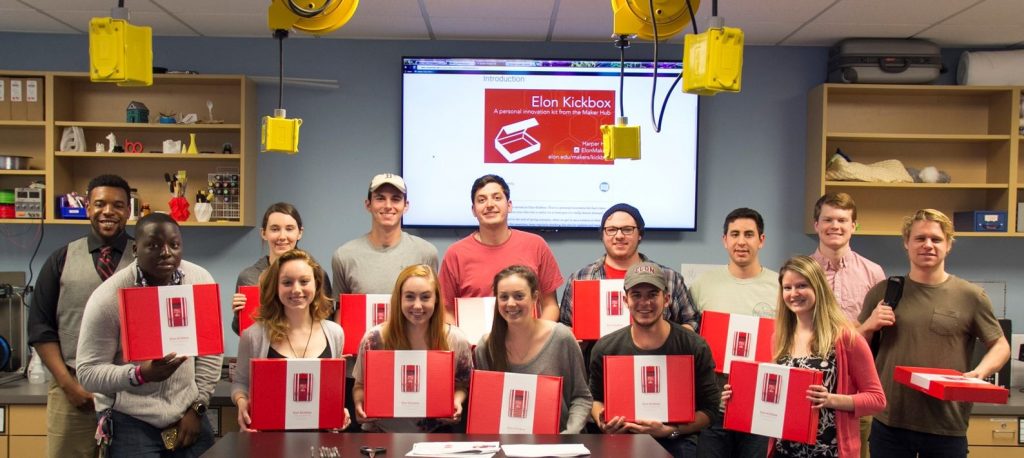- Home
- Finance & Administration
- Technology
- The Maker Hub
- Events & Programs
- Kickbox
- 2016 Kickbox projects
2016 Kickbox projects
Meet the Spring 2016 Kickboxers
In the Spring of 2016, Kickbox students designed, built, and tested their ideas. Their projects culminated in a presentation during Celebrate Week and at the Burlington Mini Maker Faire. Below are short summaries of each project. You can follow their progress on their Hackaday.io pages, listed under each project.
Watch all the Kickbox presentations on Youtube.
Recovery Systems for Amateur Rockets
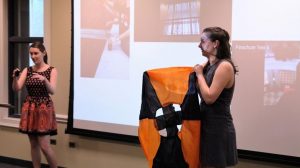 Lead investigator: Keeley Collins, Biochemistry
Lead investigator: Keeley Collins, Biochemistry
Faculty/staff sponsor: Scott Wolter, Engineering
Collins and her team will design a new model rocket recovery method, as well as an electronic system for collecting model rocket flight data. To construct this amateur rocket equipment, she plans to take advantage of the Maker Hub’s plethora of tools, such as Arduino, the 3-D printer, the sewing machines. The overarching goal of this project is to demonstrate the fun and accessibility of large-scale amateur rocketry to those who might otherwise be too intimidated to get involved in the field.
Learn more about the Recovery Systems for Amateur Rockets project on their Hackaday.io page.
Stoichiometry Board Game
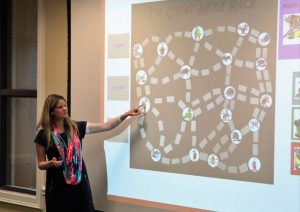 Lead investigator: Alexandra Strelow, Masters of Education
Lead investigator: Alexandra Strelow, Masters of Education
Faculty/staff sponsor: Katie King, Psychology
Strelow noticed that her high school chemistry students had most difficulty mastering math-based concepts that couldn’t be easily observed in lab experiments or class demonstrations. To help her sophomores better understand one of the gnarliest chemistry concepts, stoichiometry, Strelow will develop an educational board game to be used in the classroom. This semester, in addition to constructing the game, Strelow will observe how the collaborative, engaging board game format contributes to her students’ understanding of stoichiometry and share her findings with her fellow teachers.
Learn more about the Stoichiometry Board Game project on their Hackaday.io page.
Window Garden
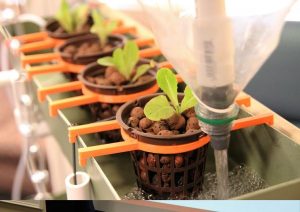 Lead investigator: Jonathan Howar, Engineering Physics
Lead investigator: Jonathan Howar, Engineering Physics
Faculty/staff sponsor: Sirena Hargrove-Leak, Engineering
Window Farm will be an indoor, hydroponic gardening system that maximizes the efficiency and minimizes the inconvenience of home food production. Unlike hydroponic systems currently available for purchase, Window Farm won’t take up valuable counter space. Instead, this set of 4-6 plots will be mountable on any window ledge.
The Window Farm project’s Hackaday.io page is private.
Science-Themed Artwork
 Lead investigator: Pete Victoratos, Engineering Physics and Communication Design
Lead investigator: Pete Victoratos, Engineering Physics and Communication Design
Faculty/staff sponsor: Martin Kamela, Physics
This semester, Victoratos will construct a piece of science-themed artwork to spruce up the science department. Although the exact form of the art is still to be determined, Victoratos has considered building a bowling ball wave pendulum, a Rube Goldberg machine, or a “Singing Ringing Tree.” Ideally, he would like the piece to evolve into a collaborative project that other current (and even future) Elon students can contribute to.
Learn more about the Science-Themed Artwork project on their Hackaday.io page.
Smart Mirror
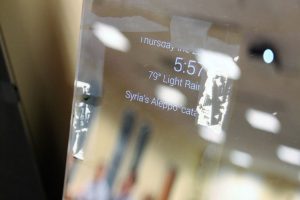 Primary investigator: Robert Danis, Accounting
Primary investigator: Robert Danis, Accounting
Faculty/staff sponsor: Joel Hollingsworth, Computer Sciences
Want to check the temperature outside before you get dressed in the morning, or peruse the headlines while you brush your teeth? Danis’ Smart Mirror project will make use of two-way mirror plastic and an Android device to create an informative piece of home decor like the one Arnold Schwarzenegger’s character uses in The 6th Day.
Learn more about the Smart Mirror project on their Hackaday.io page.
Our-Watch
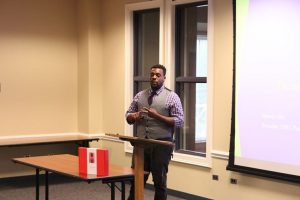 Lead investigator: Emanuel Obi, Media Analytics
Lead investigator: Emanuel Obi, Media Analytics
Faculty/staff sponsor: Ben Hannam, Communications
Our-Watch will be a social media platform that helps citizens, law enforcement, and the judicial system collaborate to protect their communities. Law enforcement officers with dashboard and body cams, as well as bystanders who capture images or videos of crimes, will be able to upload files to the Our-Watch database. Our-Watch will then sort and organize the files for easy access and recovery. In this way, Our-Watch will serve as a permanent, up-to-date database for law enforcement.
Learn more about the Our-Watch project on their Hackaday.io page.
Altrev
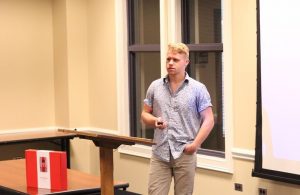 Primary investigator: Atticus Grinder, Economics
Primary investigator: Atticus Grinder, Economics
Faculty/staff sponsor: Sean McMahon, Entrepreneurship
Altrev aims to transfer the unused money from unspent gift cards (which can amount to hundreds of millions of dollars each year) to developing economies across the globe. Grinder envisions Altrev as an application where shoppers can donate their remaining gift card balances in exchange for store reward points, and the funds are subsequently distributed to Microfinance institutions. This application will not only facilitate individual charitable donations, but also help companies practice social responsibility and, as a result, reflect well on the United States economy.
Mic Box
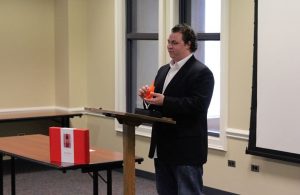 Lead investigator: Alexander Harris, Theatre Arts Design and Production
Lead investigator: Alexander Harris, Theatre Arts Design and Production
Faculty/staff sponsor: Michael Smith, Performing Arts
When performers wear wireless microphone body packs on stage, this expensive equipment is vulnerable to getting wet, overheated, or knocked around. But the protective cases for body packs currently on the market only shield against water damage. The Mic Box seeks to be the first ergonomic, form-fitting case that provides threefold protection against moisture, heat, and physical impacts.
Learn more about the Mic Box project on their Hackaday.io page.
Flex Rod
Lead investigator: Jacob Penn, Entrepreneurship
Faculty/staff sponsor: Barth Strempek, Entrepreneurship
This project seeks to eliminate the hassle of bending over and maneuvering around furniture to reach outlets. The Flex Rod will be a flexible, self-supporting cord that, once plugged in, can be bent and twisted into whatever shape suits the user’s needs. Penn envisions the head of the Flex Rod to rotate 180 degrees with two standard outlets, as well as two USB ports to plug into.
